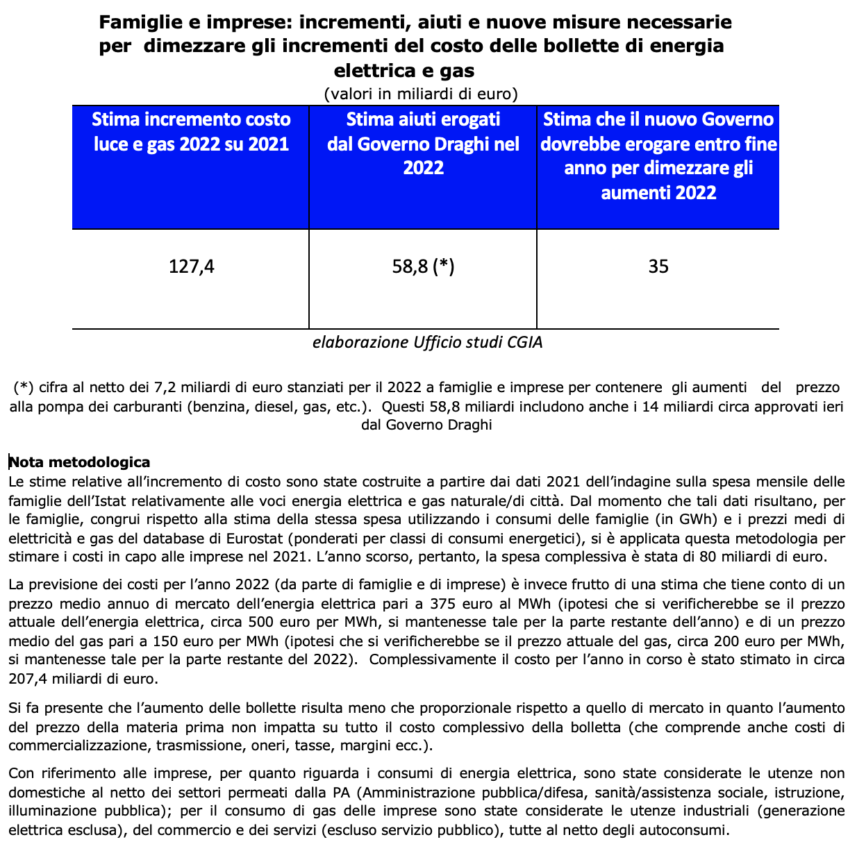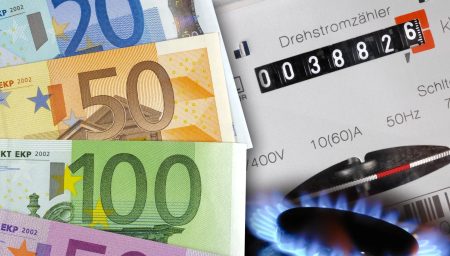Unpaid boom: if no action is taken with adequate resources, 30% of households and SMEs may no longer be able to pay for electricity and gas by the end of the year
The "inheritance" that the new government will find as a dowry amounts to at least 35 billion euros. Or rather, the amount that should be paid by the end of this year, at least to halve the effects of the current energy crisis. Otherwise, the risk that many businesses and as many families are not in a position to pay their bills and, consequently, to have their supply closed, is very high. To say it is the CGIA Studies Office.
How was this figure calculated? If we consider that, compared to last year, the Cuban energy price increases in 2022 were 127,4 billion euros, this amount must be subtracted from the 58,8 billion support provided by the Draghi government to counter the high bills. This latter amount also includes the approximately 14 billion that the Draghi government approved yesterday. Compared to 2021, therefore, households and businesses, net of the aid allocated, will have to bear the cost of an increase in the cost of electricity and gas of almost 70 billion euros.
• The 2023 Budget Law must also be approved
Deeming it unlikely that this increase will be reset to zero, according to the CGIA Studies Office, the new executive that will "come out" of the polls on September 25 will have to recover at least half (35 billion) by the end of the year to support those who have not the money to pay them, otherwise the risk that the country "collapses" is very likely. An economic commitment that will shake the veins in the wrists, given that by the end of the year, unless we "slide" towards the provisional exercise, the new Parliament will also have to approve the Budget law for 2023 for several dozen billion euros.
• We risk that by the end of the year 30% of households and SMEs will not be able to pay their bills
According to the sample survey conducted last February by Arte, 15,4 percent of SMEs and domestic users (many of whom are self-employed and VAT numbers) had failed to honor the payment of their electricity and gas bills. . The outstanding amounts amounted to 26 million euros, a figure which, in the meantime, has certainly increased. Seven months ago the amount of debts averaged between 7-800 euros per month for home users, about 5 euros for small businesses and VAT numbers. With the increases that have characterized the electricity and gas bills in recent months, reports the CGIA Studies Office, we run the danger that by the end of the year there will be at least 30 percent domestic users and unable SMEs. to pay the bills.
• Aid: 180 billion for Covid, “only” 58,8 against expensive energy
According to many experts, the negative economic effects of the high bills that hit families and businesses this year would be comparable to those caused in the last 2 years by the pandemic. We recall that between the closures established by decree for many economic sectors and the limitations on the mobility of people imposed by law, between 2020 and 2021 the successive governments have disbursed 180 billion euros in aid. Thanks to the refreshments, the non-repayable contributions and the tax credits, the country has remained standing. Of course, the public debt compared to GDP had risen to 155 percent (year 2020), however the social crisis remained under control and our country, with an intensity higher than many others, managed to recover. The proof of this is that, to date, while still hitting a very worrying threshold, the debt / GDP ratio has dropped to 148 percent. With the energy crisis, however, in 2022 the measures to mitigate the expensive bills amounted to 58,8 billion euros; resources which, it should be emphasized, have been allocated without resorting to any budget variance, even if it is evident to all that they appear insufficient to face an energy crisis that has brought us back almost 50 years. At least until the European Union imposes a cap on the price of gas and the decoupling between it and that of electricity produced from renewables.
• There is no alternative: it is necessary to make the budget variance
The first 100 days of the new executive will be fraught with problems and difficulties. We knew it. And whoever wins the elections, especially at the beginning, will have few financial resources available. Equally well-known. However, if these measures to contain the increases in energy costs are approved, they will have to be recovered through a new deficit. Otherwise, for many suppliers, non-payment / arrears by users, especially the November and December bills which are among the most expensive of the year, will experience a surge never seen before. It is clear, at least until the EU reaches an agreement on the introduction of a cap on the price of gas and the decoupling of the latter from that of electricity produced with renewables, the only thing to do it is restoring businesses and families in difficulty, offsetting at least half the increase in the cost of energy, recovering resources through an increase in public debt. Obviously with the consent of Brussels which, in the meantime, should loosen the regulatory constraints on state aid.
• “Only” one third of our public debt is at risk
Thanks to the massive injection of liquidity introduced in the last 5-6 years by the ECB with Quantitative easing, one third of our public debt is now held by Frankfurt. Therefore, over 900 billion would be practically "protected" from any form of international financial speculation. If we take into account that about another 66 percent of the remaining part is held by Italian savers (families, banks, insurance companies, etc.), it means that "only" one third of the total Italian public debt would be in the hands of foreign investors who, potentially, they could “trigger”, if they do not consider our country solvent, a sharp increase in the spread and a consequent financial meltdown. Having ascertained that the situation is less critical than it might seem, this does not mean that we can dramatically increase public spending, ignoring everything and everyone. God forbid. However, if we do not want an important piece of our economy to close, in our opinion it is necessary to put in place another 35 billion in aid by the end of the year which could, as a last resort, be offset by a corresponding increase in the public debt.
• Alternatively, tax the extra profits of energy companies at 75%?
As an alternative to the budget gap, could the 35 billion euros needed to "save" many families and as many businesses be recovered through the tightening of the taxation of the extra-profits of energy companies? Does this proposal, launched in recent days by some Italian political leaders, appear feasible? In theory, yes, although it should be noted that with the current taxation set by decree at 25 percent, the Treasury aims to collect just over 10 billion euros. Therefore, to collect the 35 billion it would be necessary to bring the level of taxation to around 75 percent. It should be remembered that, however, the energy companies, at the expiry of the first installment scheduled towards the end of last June, paid just under 1 billion compared to the 4 expected; Would they "agree" to see the levy triple?

